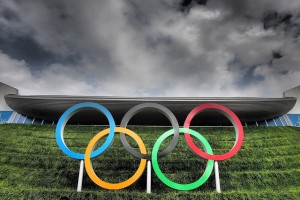Reporting on the Olympics

Photo by Farrukh of the aquatic centre, London Olympics. CC by NC 2.0 via Flickr.
Much of the reporting on some women athletes participating in the Rio Olympics is insupportable. It makes assumptions about their bodies, sex, gender identity and expressions that is deeply concerning. Much reporting fails to acknowledge the lack of scientific evidence for body policing by sporting institutions, and the deep personal cost of such assumptions, which range from personal humiliation and suicidality, to unnecessary, irreversible and harmful medical interventions in order to continue to compete in sport.
In contrast, we would like to draw attention to this excellent recent article by Katrina Karkazis, “One-Track Minds: Semenya, Chand & the Violence of Public Scrutiny”:
The relentless comments include the media’s and public’s willingness to scrutinize their bodies, question their identity, and invade their privacy with impunity. Such representations invite unwelcome speculation about the configuration of these athletes’ genitals, whether they have ovaries or testes, and whether their chromosomes are XX or XY. Too many have made assumptions about their hormone levels based on how they look and how they perform, questioning whether they should be allowed to compete, or even be considered women at all. One journalist disturbingly called women subject to investigation “uncategorised” — a declaration indicative of the kind of privilege that comes from having a body or gender presentation that escapes such scrutiny…
The violation of privacy has taken place in ways horrifying and yet predictable. Karla Holloway, the James B. Duke Professor of English & Professor of Law at Duke University, has noted that privacy is implicitly reserved for socially-privileged groups: male, white, heterosexual. Living outside these interlocking privileges means inhabiting a body that is always, to some extent, treated as public and open to scrutiny, probing, and coercion in way invisible to the institutions and individuals doing the looking. It is thus not surprising the vast majority of the women investigated under the IAAF policies have been brown or black women from the Global South.
In 2014, Morgan Carpenter, then president of OII Australia, joined other experts on human rights, sport, and intersex, in a letter to the IAAF regarding the disqualification of Dutee Chand and the IAAF’s “hyperandrogenism” policy. The letter has just been published.
We also commend:
- An editorial by Scientific American, July 2016, titled “Naturally Occurring High Testosterone Shouldn’t Keep Female Athletes Out of Competition” and based on scientific evidence. Scientific American also mentions the percentage of male competitors (some of whom may have intersex traits) whose testosterone levels are either below the typical male range, or within the typical female range – an issue that is rightly irrelevant to their participation in men’s sport.
- An article on “The Humiliating Practice of Sex-Testing Female Athletes” by Ruth Padawer in the New York Times, June 2016, recently syndicated in the Sydney Morning Herald and The Age.
- Australian Olympian Madeleine Pape, writing for SBS on “Why I now stand with Caster Semenya”, August 2016.
- An article by Michelle Griffin in The Age, “Sex testing in sport: How athlete Madeleine Pape came to champion Caster Semenya”, that quotes Madeleine Pape.
In recent days, three clinicians with involvement in IOC policies on sex testing women athletes, have also made a statement against sex testing and indiscriminate public scrutiny, in “The Olympic Games and Athletic Sex Assignment”, in the Journal of the American Medical Association.
These articles draw attention to the personal cost of speculation and salacious attention to the bodies of Caster Semenya and Dutee Chand. We believe that bodily diversity is good, necessary and to be celebrated; and we seek an end to the stigmatisation of bodies that are different. We wish Caster and Dutee all the very best in coming days!
Press
Brook B. There should be no questions about Caster Semenya’s right to compete at the Olympics, say experts. News.Com.Au. 16 August 2016.
McCormack A. Why debate surrounds Caster Semenya’s performance at Rio . ABC triple j. 17 August 2016.
Stewart E. Haters and hyperandrogenism: Caster Semenya’s road to becoming an Olympic favourite.. 17 August 2016.
You must be logged in to post a comment.